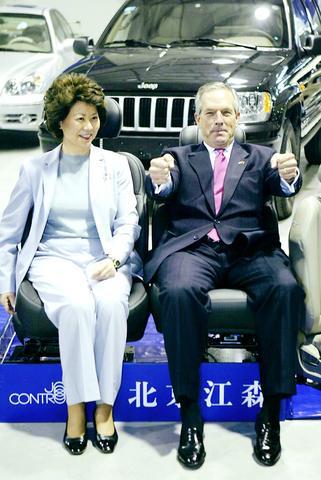The US urged China yesterday to wage a wider war against rampant patent and copyright piracy as it sought ways to reduce a growing trade imbalance that has become an election issue in the US.
Beijing needed to do much more to battle counterfeiting that had seriously harmed US firms and workers, US Secretary of Commerce Don Evans told reporters during a four-day visit to China.

PHOTO: EPA
"There needs to be much more efforts, much more resources put into the protection of intellectual property rights across the country," Evans told reporters during a visit to a factory in a Beijing suburb.
The Chinese authorities needed to do more at the provincial and city levels, he said, two months after Chinese Vice Premier Wu Yi (吳儀) pledged during meetings with Evans in Washington to intensify a crackdown on counterfeiting.
China's own State Council has estimated the market value of counterfeit goods in China at about US$19 billion to US$24 billion annually. The bogus trade affects a wide range of US products, including films, music, publishing, software, pharmaceuticals, information technology and automotive parts.
Washington also hoped to do more to reduce its trade deficit with the world's fourth-biggest trading nation, which hit a record US$124 billion last year and is expected to head higher.
"In the first four months of this year the trade deficit continued to grow, so we need to continue to work on ways to reduce those trade barriers," Evans said.
He also reiterated Washington's desire to see the yuan liberalized.
"We think it's very important to have a flexible, market-driven exchange rate. That coupled with free trade and free flow of capital," he said.
"There is a working group between the United States and China working on that and we will continue to work for it," he said.
Investors have speculated China may make the yuan more flexible as early as this year by pegging it to a basket of foreign currencies and letting it move more freely, a step many analysts expect would lead the currency to strengthen. Analysts say China will only do so in its own time, rather than bow to foreign pressure.
Evans also oversaw the signing of a series of deals between US and Chinese business yesterday, including an agreement by General Electric, the world's biggest maker of turbines, to sell two electric transfer systems to China Southern Power Grid Co.
Honeywell Inc, meanwhile, agreed to supply environmentally friendly refrigerants and other chemicals to home appliance maker Haier. No terms of the deals were given.
"These partnerships will grow American jobs and contribute to America's economic development," Evans said.
"These signings are an example of the strong commercial bonds being forged between the United States and China," he said
Also signed yesterday was a deal with United Solar Ovonic and Dawson International to provide and install a 300-kilowatt solar photovoltaic lighting system in the Beijing New Capital Museum.
Evans was scheduled to meet Chinese Premier Wen Jiabao (溫家寶) yesterday for talks that will also include US Secretary of Labor Elaine Chao who is in Beijing.
Today, Evans will meet separately with Vice Premier Wu Yi (吳儀), Vice Premier Zeng Peiyan (曾培炎) and Commerce Minister Bo Xilai (薄熙來) following a breakfast speech with US businesspeople.

SECURITY: As China is ‘reshaping’ Hong Kong’s population, Taiwan must raise the eligibility threshold for applications from Hong Kongers, Chiu Chui-cheng said When Hong Kong and Macau citizens apply for residency in Taiwan, it would be under a new category that includes a “national security observation period,” Mainland Affairs Council (MAC) Minister Chiu Chui-cheng (邱垂正) said yesterday. President William Lai (賴清德) on March 13 announced 17 strategies to counter China’s aggression toward Taiwan, including incorporating national security considerations into the review process for residency applications from Hong Kong and Macau citizens. The situation in Hong Kong is constantly changing, Chiu said to media yesterday on the sidelines of the Taipei Technology Run hosted by the Taipei Neihu Technology Park Development Association. With

CARROT AND STICK: While unrelenting in its military threats, China attracted nearly 40,000 Taiwanese to over 400 business events last year Nearly 40,000 Taiwanese last year joined industry events in China, such as conferences and trade fairs, supported by the Chinese government, a study showed yesterday, as Beijing ramps up a charm offensive toward Taipei alongside military pressure. China has long taken a carrot-and-stick approach to Taiwan, threatening it with the prospect of military action while reaching out to those it believes are amenable to Beijing’s point of view. Taiwanese security officials are wary of what they see as Beijing’s influence campaigns to sway public opinion after Taipei and Beijing gradually resumed travel links halted by the COVID-19 pandemic, but the scale of

A US Marine Corps regiment equipped with Naval Strike Missiles (NSM) is set to participate in the upcoming Balikatan 25 exercise in the Luzon Strait, marking the system’s first-ever deployment in the Philippines. US and Philippine officials have separately confirmed that the Navy Marine Expeditionary Ship Interdiction System (NMESIS) — the mobile launch platform for the Naval Strike Missile — would take part in the joint exercise. The missiles are being deployed to “a strategic first island chain chokepoint” in the waters between Taiwan proper and the Philippines, US-based Naval News reported. “The Luzon Strait and Bashi Channel represent a critical access

Pope Francis is be laid to rest on Saturday after lying in state for three days in St Peter’s Basilica, where the faithful are expected to flock to pay their respects to history’s first Latin American pontiff. The cardinals met yesterday in the Vatican’s synod hall to chart the next steps before a conclave begins to choose Francis’ successor, as condolences poured in from around the world. According to current norms, the conclave must begin between May 5 and 10. The cardinals set the funeral for Saturday at 10am in St Peter’s Square, to be celebrated by the dean of the College